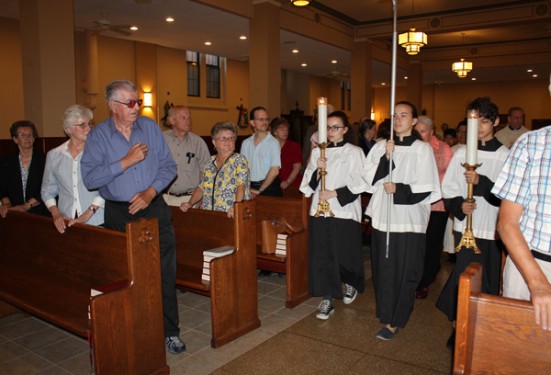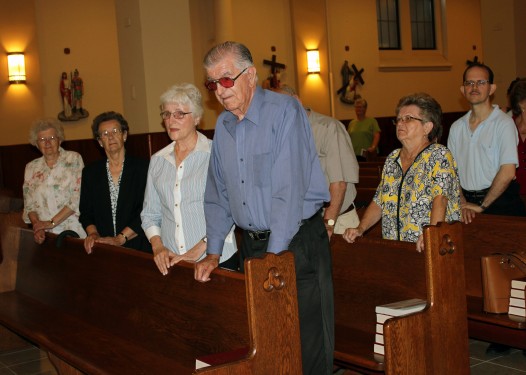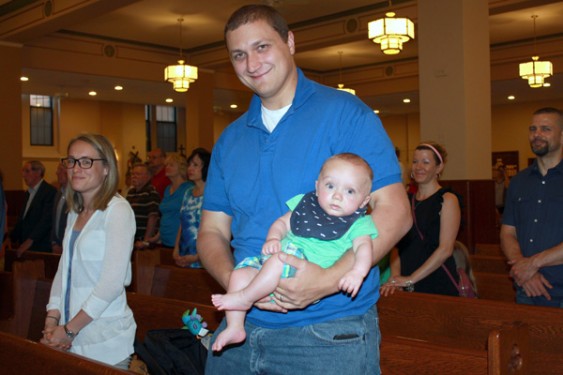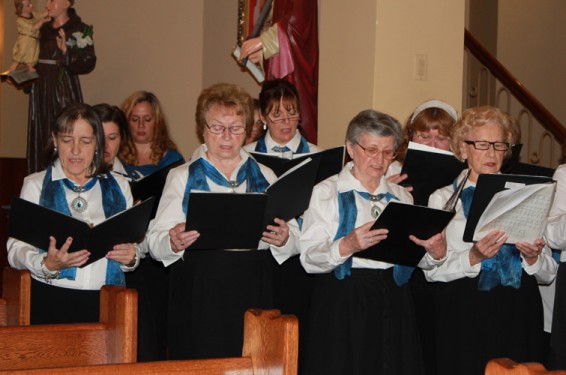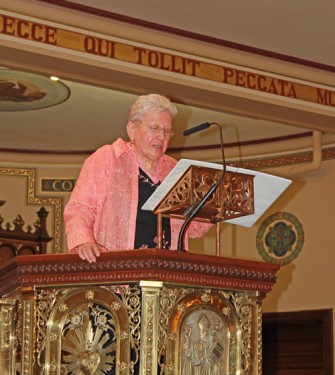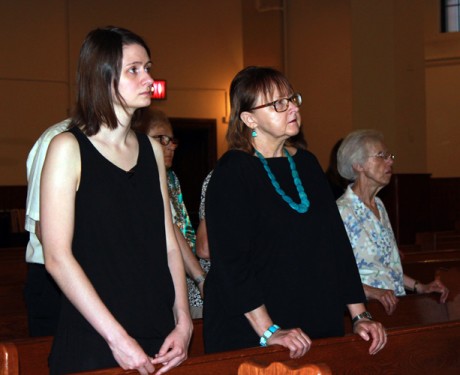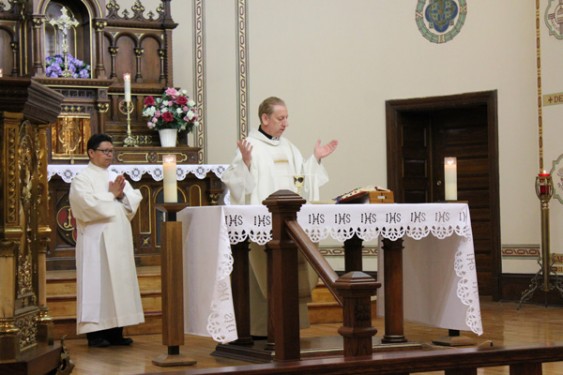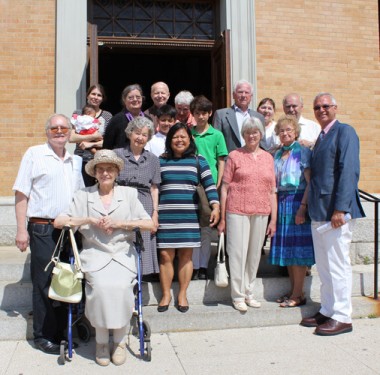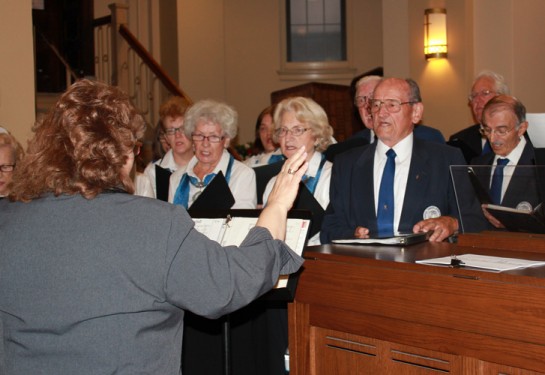
German-speaking Catholics gathered May 29 to close a chapter in diocesan history as the last regularly scheduled German Mass in the Brooklyn Diocese was held at St. Matthias Church, Ridgewood.
Ending a long tradition at St. Matthias parish, the final 8:45 a.m. German Mass was celebrated in the lower church by Father Tarcisio Andro, parochial vicar, who was assisted by Deacon Oscar Perez.
To mark this historic event, the Gottscheer Männerchor and Damenchor (Men’s and Women’s Chorus) sang Franz Schubert’s “Mass in F” in German in four-part chorus.
More than a hundred former parishioners joined with family and friends to share the Eucharist, well-known hymns and a piece of their heritage.
All of the familiar faces were there: usher Joseph Stiene with his daughters and grandchildren; lector Elfriede Struna; and the Jones sisters, Shannon and Kristin, who serve at the altar with the German-speaking Kalpaxis brothers, Simonides and Leonidas.
In the pews sat Maria Schneider, a regular at the Mass and parishioner since the 1960s. She helped bring up the gifts. Her son, Fred Hoefferle, who belongs to Our Lady of the Miraculous Medal Church, also Ridgewood, served as an extraordinary minister of Holy Communion.
The German Mass is one of three Masses being cut as part of an overall restructuring of the parish’s weekend schedule. Nine Masses in four languages are being reduced to six Masses – four English and one each in Polish and Spanish – effective the weekend of June 4-5. The daily Mass schedule has also been modified.
Father Thomas Pettei, parish administrator, made these decisions in consultation with the parish pastoral council and announced the adjustments in mid-March. He explained the decision and reasoning behind it to the congregation at the final Mass.
Among the factors behind the changes, he noted, are: declining attendance, fewer priests, the challenges posed by offering Mass in many languages and a parish community spread across nine Masses in a large-capacity church.
Father Pettei, who is the episcopal vicar for Queens, began evaluating parish practices when he arrived after the death of former pastor, Msgr. Peter Zendzian, last fall.
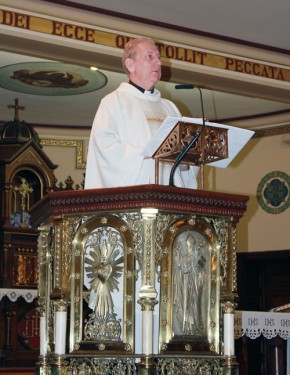
Having grown up in the parish, he realizes that Germans helped found the parish and have supported it since its establishment in 1908. However, the German population has dwindled over the years, and those who remain speak English.
He empathizes with the 20 or so people who attend the weekly German Mass, and personally met with them in the rectory before announcing the schedule change.
Former parishioners Sophie Kasner, Erna Mlekusch and Gloria Keppler returned for the final Mass.
“Nobody’s happy about this,” Keppler told a visitor as she arrived. “We’re losing our traditions.”
Back in the 1950s and ’60s, Ridgewood was a German enclave, home to immigrants and their children as well as the Gottscheers, ethnic Germans who were displaced from their homes in what is now modern-day Slovenia.
Kasner is one of the Gottscheers who immigrated to Ridgewood and found a second home at St. Matthias. She was married there, as were Mlekusch and Keppler, and later moved to Rego Park, where she joined Resurrection-Ascension parish.
Whenever she and her friends wanted a taste of home, they knew they could go to Ridgewood to hear Mass in their native tongue.
“Your mother language is the most important one,” said Maria Koenig, another displaced Gottscheer who immigrated to Ridgewood in 1952, and still attends the German Mass.
“We have our own language, and there are not many people left who speak it here,” she said.
St. Matthias Church instituted the German Mass around the late 1960s after the Second Vatican Council permitted the celebration of Mass in the vernacular.
Parishioners, like Trudy Mayer, recall German Masses celebrated first by Father Francis Dallos, and then by the former pastors, Msgr. Joseph Konrad, Albany Bishop Edward Scharfenberger and Msgr. Zendzian.
Even after moving to Garden City, L.I., Mayer continued to drive to Queens for the weekly Mass because she said, “When you’re older, Mass is a refuge.”
Now that it has ended, she says she will find a parish closer to home.
“It’s a very sad occasion for us,” added Genalin Kalpaxis, whose sons are altar servers at the weekly Mass.
Genalin is Filipino and doesn’t speak German, but her husband Leander, and their sons do. The Mass was a way for them to honor and preserve their German heritage.
“If they could offer the Mass once a month, it would give people hope,” she said.
Father Pettei told the congregation that he hopes to offer Masses in German at the parish on special occasions, but also encouraged people to choose a new Mass time.
The Kalpaxis family will attend the 8 a.m. English Mass from now on, and they hope to reconnect there with friends from the German Mass.

